Esinam Dogbatse’s tasteful and eclectic Afrojazz is ready to break out of its colourful cocoon. Before this exceptional Brussels-based musician’s first solo EP is released in September, you can savour its aromas and watch it ripen live at festivals like Jam’in Jette.
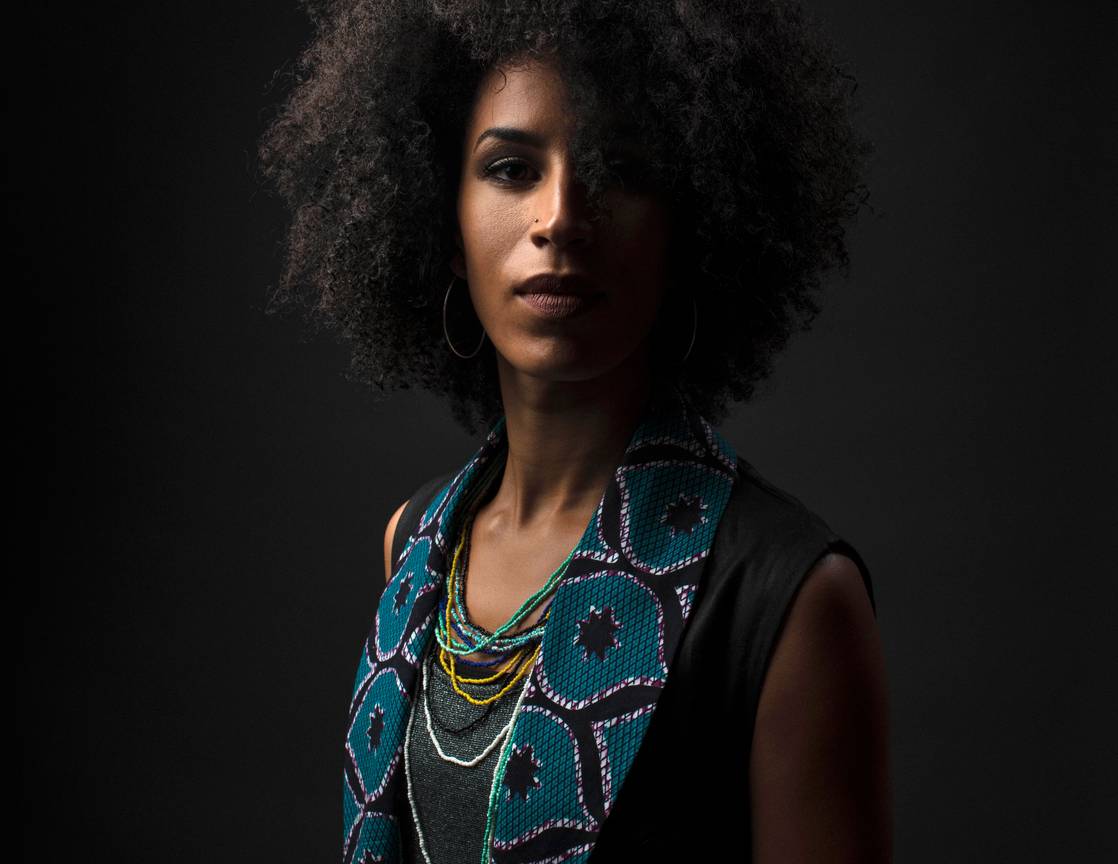
© Mael G. Lagadec
Esinam: the future of Afrojazz
Also read: Jam'in Jette
Esinam. In the language of the Ewe, the ethnic group to which Esinam Dogbatse’s Ghanaian father belongs, it means: he or she heard you. He or she refers to the creator. Traditional African names often have more profound meanings, the Brussels-based singer and multi-instrumentalist tells us as we sit in her cosy living room in a beautifully decorated terraced house in Sint-Joost/Saint-Josse. With a piano, flute, percussion instruments, and a laptop within easy reach, you can immediately tell that music plays an important role in this house. “There is much more in the cellar, which is a rehearsal space where I also record my demos,” she says with a laugh. At the end of last year, she opened three sold-out nights at the AB for Melanie De Biasio. She specifically mentions the tama, the “talking drum” which will play a major role on her first EP, but also the likembe, a traditional thumb piano, the pandeiro, a kind of tambourine, cowbells, and a series of other percussion instruments “for which different ethnic groups have different names.” They all give Esinam’s unique musical universe an original, organic touch when she blends her flute playing with rhythms and ambient that she conjures up with her loop station and drum pad.
At the loop station
“I prefer to take the smaller instruments like the talking drum to concerts because they are easier to transport,” she says. As a one woman band, she not only has a great eye for detail, but she prefers to keep things practical. That is how she became a flautist. “I have played the piano since I was a child, but when I was 18 I wanted to travel and I had trouble fitting my piano in my luggage [laughs], so I had to find a different instrument. My neighbour lent me her flute and I enjoyed playing it so much during my travels that I immediately bought myself one when I had returned home.” She learned to play it herself, first on her own and then later as a side woman in a variety of local bands. Until two years ago, she played in Témé Tan’s band, for which she sometimes still opens shows. But she was also a member of the jazz ensemble led by the Brussels jazz pianist Anne Wolf and spent several years in the desert blues formation Kel Assouf.
“Playing in bands was great until I suddenly had far fewer concert bookings and started to feel lost. I started experimenting with a loop station at home. My first, very improvisational public solo performance followed five years ago for the celebration of the tenth anniversary of Muziekpublique. And when I was asked to play at the Sfinks festival in 2014, I started getting really excited. I looked around, saw all the instruments that I had collected over the years, and decided that the time was ripe to create my own musical universe. I had never really managed that as a side woman in all those different bands. But those experiences did mean that I knew a lot of people who could help me get bookings. Everything took a little longer than normal in my case because I had never attended a conservatory and because I am not descended from a family of musicians.”
I want to continue to develop my roots in my music, but on the other hand, I was born here. Brussels is the perfect place for me to do what I do
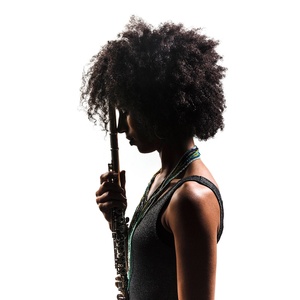
Afrofuturism
Esinam is not actually entirely sure where she did get her passion for music. “My (Belgian) mother told me that she danced a lot when she was pregnant, but I don’t know if that had any effect. [Laughs] My parents would sometimes take me to festivals, but to them, the little talking drum that they gave me as a present was more of a rhythmic toy than a real musical instrument. And yet, I was unstoppable. When I was four, I asked my mother when I would finally be allowed to play a real instrument, but I was still too small to go to music school.” The music at home ranged from reggae to Beethoven, and there were cassettes of Ghanaian highlife (traditional music played on western instruments), with which she would become more familiar later during trips to Accra, Ghana’s capital.
“I have played with local musicians during family visits, and whenever big Ghanaian artists come to Brussels on tour, like Pat Thomas or Ebo Taylor, I always try to be there. I want to continue to develop my roots in my music, but on the other hand, I was born here. Brussels is the perfect place for me to do what I do. Everything is blended here. When my father first arrived here, things were very different. There was a lot more racism and a lot less work. He now lives in Amsterdam, where the Ghanaian community is bigger. I was one of the first métisses, and I was incredibly proud. But my mother was often told things like: ‘Oh, what a beautiful baby you adopted!’ She never took it badly, but the mentality has changed dramatically.”
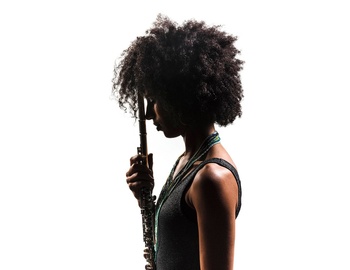
© Mael G Lagadec
| Esinam: 'To really know me, you have to listen to my music'
In Esinam’s case, this is expressed in a scene that is very colourful and open-minded, and which wholeheartedly supports her quirky but exceptionally atmospheric bastard compositions. They sometimes sound raw and percussive, but also dreamy and mysterious. Last year, she recorded her first single “Electric Lady” with Senegalese musician/producer Ibaaku, who gave her sound and voice collages an Afrofuturistic twist. “I really wanted to make something that would make people want to dance,” she says. “The four tracks that will be on the EP each show a different side of me. But all together, they exude the atmosphere that you could call my universe. To really get to know me, you have to listen to my music.” The recordings were done partly in her cellar and partly at the nearby Studio Planet, where she improved her demos with sound engineer Jules Fradet (who recently mixed the hip-hop soundtrack of the film Tueurs). The result will be released by Sdban, the indie label that is also home to STUFF. and De Beren Gieren. It took a while, but at 33 years old, it’s time for Esinam to be heard by more than the creator.
> Jamin’Jette: Esinam. 18/5, 22.15, Jeugdpark/Parc de la Jeunesse
> Later dates: 25 & 26/5 (Brussels Jazz Weekend), 8/6 (L’Harmonium), 23/6 (Plazey), 21/9 (Botanique)
Read more about: Muziek , Jam'in Jette
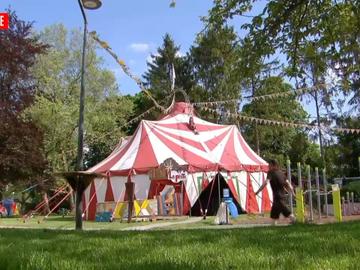
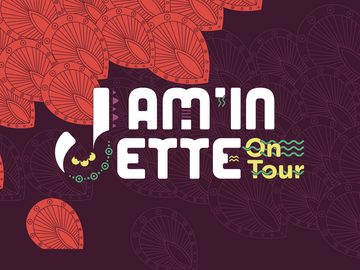
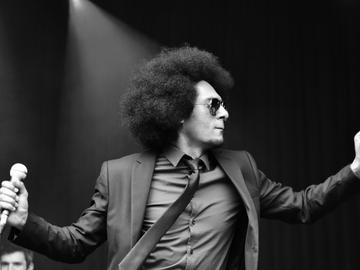
Fijn dat je wil reageren. Wie reageert, gaat akkoord met onze huisregels. Hoe reageren via Disqus? Een woordje uitleg.